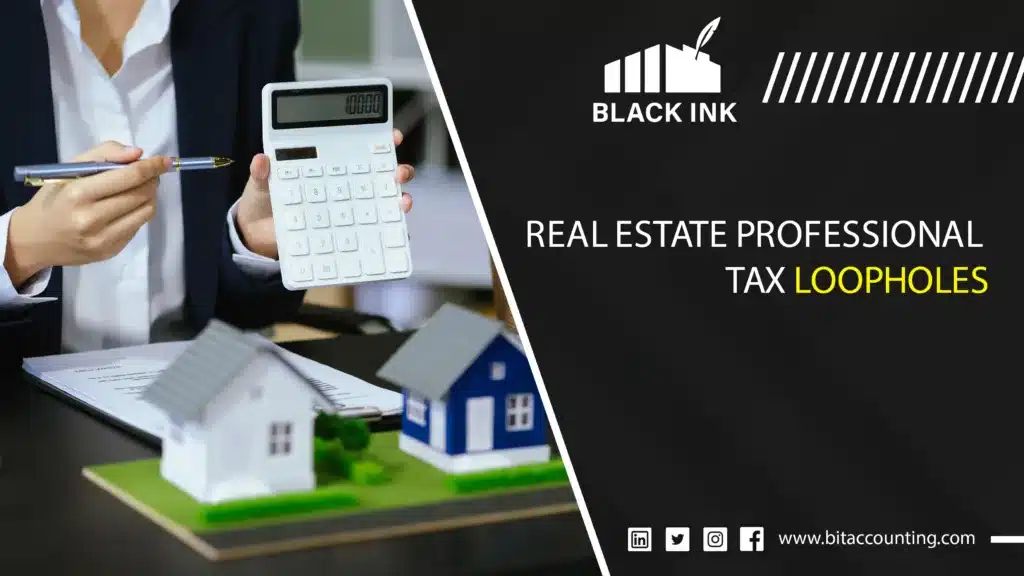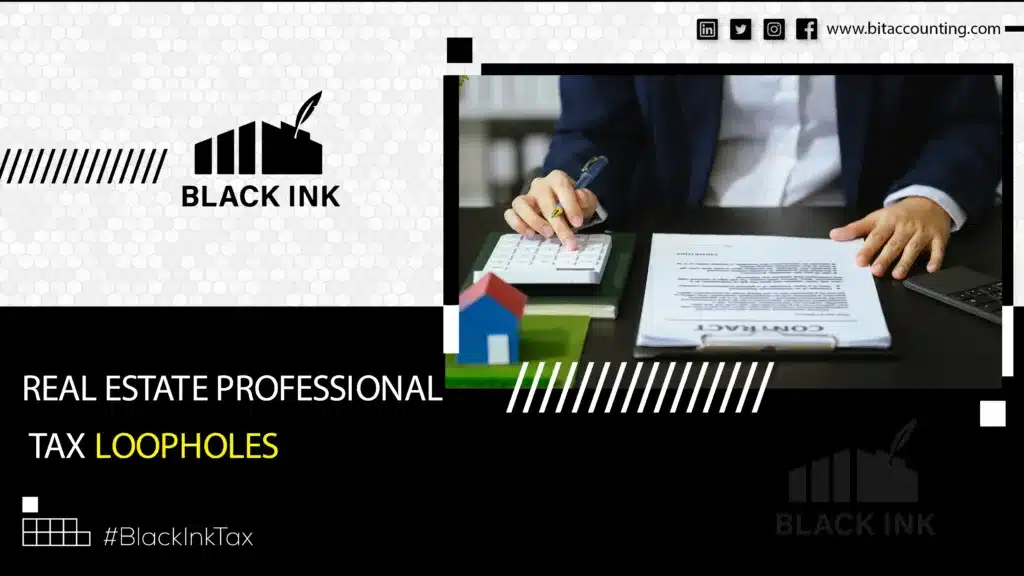
Table of Contents
The Real Estate Professional Tax Loopholes For Saving Taxes
Let’s be real, no one likes when they have to handover a huge amount of money to the IRS or the government, especially when you are hustling and working hard day and night in the real estate business. But how would you feel if you knew there were some loopholes that could reduce your real estate tax so you could save more money? Luckily for you, there are some real estate professional tax loopholes that you can follow to reduce your tax and save thousands of dollars every year. No matter if you are renting houses, buying properties, or even trying to work on your Airbnb business. Let’s get into the world of real estate professional tax loopholes! We will explain everything you need to know.
What Is REP and Why Does It Matter?
The Real Estate Professional (REP) tax status is a designation by the IRS that allows qualifying tax paying citizens to treat rental real estate activities as non-passive, enabling them to offset losses against other income.
Which Activities Count as Real Estate Professional Tax Loopholes?
To qualify for REP status, the IRS considers several real estate activities:
- Development: taking part in building or changing properties.
- Transactional Work: Real estate work that has to do with purchasing, reselling, or arranging property deals.
- Property Management: Supervising rental operations, maintenance, and tenant connections.
Engaging in these activities for more than 750 hours annually is a key criterion for REP qualification.
Real Estate Professional Tax Loopholes Classification
Here are the real estate professional tax loopholes classifications for better understanding:
IRS Classification Loophole: Real Estate Professional (REP) Status
- Material Participation Loophole: REP who spend over 750 hours annually on real estate activities can classify rental income as non-passive. This allows them to deduct unlimited rental losses against ordinary income.
- Passive Loss Recharacterization: The professionals can convert otherwise passive real estate losses into active losses, which can offset W-2 or business income.
Deduction-Based Real Estate Professional Tax Loopholes and Tax Benefits
- Home Office Deduction: Individuals who use part of their home exclusively for real estate operations may deduct a percentage of their rent or mortgage, utilities, internet, and repairs.
- Section 179 Deduction: Real estate agents who use commercial property, such as office equipment or qualified automobiles, can deduct the full amount in the year they buy it, but there are limits.
- Startup Cost Deduction: You can exclude up to $5,000 in starting and organizational costs in the year the real estate business starts up.
- Qualified Business Income Deduction: People who run their businesses through pass-through organizations like S Corporations or LLCs may be able to keep up to 20% of their eligible real estate revenue under Section 199A.
Depreciation-Based Real Estate Professional Tax Loopholes
- Cost Segregation Studies: Cost segregation allows faster depreciation of certain property components over 5, 7, or 15 years instead of the standard 27.5 or 39 years.
- Bonus Depreciation: Real estate professionals can deduct 100% of the cost in the first year, enhancing early tax savings.
- Residential Property: Residential rental properties can be depreciated over 27.5 years.

Capital Gains and Property Sale Loopholes
- Section 1031: If you sell an investment property and use the money to buy another one of the same type, you can put off paying capital gains tax under IRS Section 1031.
- Section 121: If you lived in your principal residence for at least two of the last five years, you can leave out up to $250,000 in capital gains from the sale.
- Installment Sale Method: You can spread out the payment of capital gains over several years by selling a property through a legally structured installment sale arrangement.
- Opportunity Zones: Depending on how long you keep the investment, reinvesting capital gains into chosen opportunity zones might delay or even remove future capital gains taxes.
- Charitable Remainder Trusts: Avoid capital gains taxes by donating property to a trust, allowing you to enjoy income while postponing taxes and helping charitable organizations.
Rental Income and Payroll Tax Avoidance
- Self-Rental Strategy: Renting property to your own business may allow classification as active income, making it eligible for full deductions under REP rules.
- Avoidance of Payroll Taxes on Rental Income: Since rental income is typically not subject to self-employment tax, real estate professionals can earn substantial income while legally avoiding payroll taxes.
- 7-Day Rule: Properties rented for an average of 7 days or less may be treated as active income, allowing expense deductions without being classified as rental activity.
Benefits of Understanding Real Estate Tax Loopholes
If you really get the hang of these loopholes, you will realize how beneficial they are:
Better CashFlow Management
When you get qualified for REP status, investors can deduct real estate losses against their other income, reducing taxable income and enhancing your cash flow.
Competitive Advantage
Understanding and utilizing tax loopholes can provide a financial edge, allowing investors to reinvest savings into more properties or improvements.
Increased Opportunities
Tax savings can free up capital, enabling investors to explore diverse real estate ventures and expand their portfolios.
What If You’re Profitable? Does the Loophole Apply?
Yes, even profitable investors can benefit from REP status. By offsetting other income with real estate losses or deductions, they can reduce overall tax liabilities, maximizing net income.
Conclusion
With the Real Estate Professional Tax Loophole, investors can lawfully cut their tax burden and achieve better long-term profits on real estate. According to IRS standards, investors can treat rental losses as active if they are real estate professionals. This allows for deductions and depreciation strategies. But it’s really vital to keep proper records, talk to a CPA, and keep up with IRS laws. Being able to take advantage of this loophole could give you an edge over your competition and leave a lasting financial legacy in real estate.
FAQs
1: What is the Real Estate Professional Tax Loophole (REP)?
It’s a designation that allows qualifying individuals to treat rental real estate losses as active, enabling them to offset those losses against other forms of income like wages, capital gains, or business profits.
2: How do I qualify for REP status?
You must spend over 750 hours per year on qualified real estate activities and more than 50% of your total working time must be in the real estate field.
3: Can part-time investors qualify for the Real Estate Professional Tax Loophole?
It’s difficult, but not impossible. You’ll need clear documentation of hours and demonstrate that real estate constitutes the majority of your work activity during the year.
4: What’s the difference between active and passive real estate income?
Active income involves material participation in the real estate business, while passive income usually comes from investments where you don’t materially participate. REP status allows you to treat passive losses as active.
5: Do vacation rental owners qualify for REP?
Yes, if they meet the hour and participation tests. However, special IRS rules apply to short-term rentals, so tracking usage and operations is critical.
GET FREE QUOTE FOR ALL OF OUR SERVICES
Black Ink will send you a free analysis of your current state and what would be the cost of managing either a separate accounting and bookkeeping services or a complete solution across New York, USA. Do get in touch and we will be happy to consult you with our bookkeeping services in NY, New York, USA.
